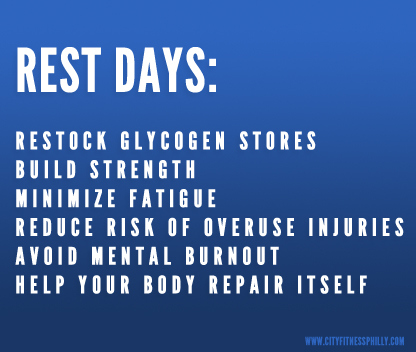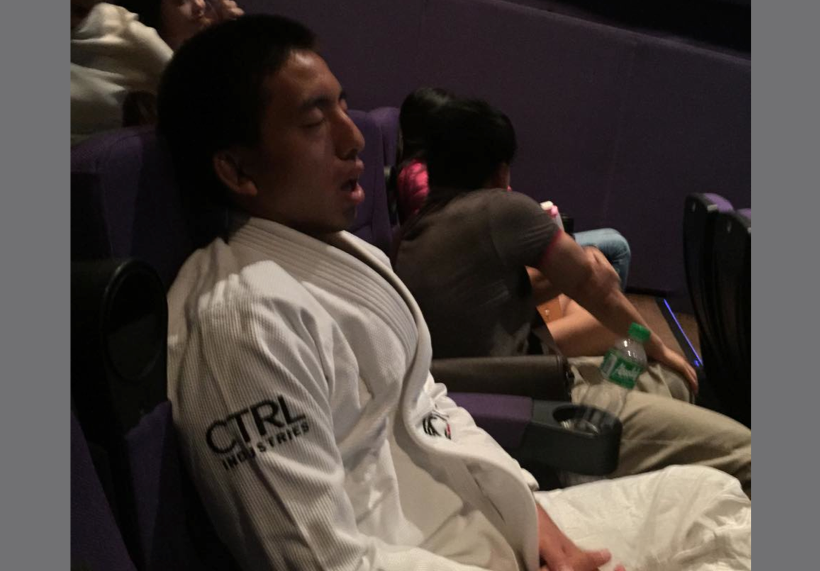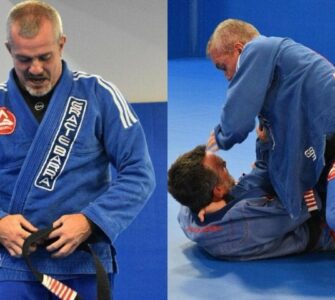Written By Guillaume Huni, BJJ black belt and head instructor of Kimura Jiu-Jitsu Academy in Belgrade, Serbia.
Photo by Ralph Go
At this stage of my life, there are two phases in my BJJ training: When I’m preparing for a competition and when I train without a competition in mind.
The competition training period is much more intense and is comprised of 5-6 BJJ trainings per week + with 2 sessions of strength and conditiong per week (2 months before the competition). The period without pressure of competitions is much more relaxed with just 3-5 BJJ training sessions per week.
These two periods are really different in the intensity, frequency and mental aspect of training. Over the years, through trial and error, I’ve finally learned how to listen to my body and to avoid overtraining as much as possible.
 |
| Are you overtraining? |
There are really simple ways to know if you are overtraining. Here are the symptoms:
– Lack of enjoyment during class
– Slight fevers
– Series of injuries
– Delayed reaction times
– Depression
– Constant soreness and tiredness
– Lack of motivation to go to training
If these things happen, don’t hesitate to take a break. Either don’t do any Jiu-Jitsu for a few days or do a completely different sport for a while (to stay in shape).You will also perform better after a break. Doing one class with a fresh body and mind is better than doing three classes feeling tired and bored.Resting is as important as training.
The problem, is when one is training for competition, the limits of physical and mental toughness have to be pushed in order to come in the best shape possible on D day .
During our workouts and BJJ training, we create tiny tears in our muscles. When we allow the muscles to rest, the tissue is able to repair itself using proteins and their amino acids. This creates stronger muscles over time.
Continuous workouts without rest will actually make us weaker- not stronger.
What Happens During Recovery?
According to sportsmedicine.about.com:
“Recovery time into any training program is important because this is the time that the body adapts to the stress of exercise and the real training effect takes place. Recovery also allows the body to replenish energy stores and repair damaged tissues. Exercise or any other physical work causes changes in the body such as muscle tissue breakdown and the depletion of energy stores (muscle glycogen) as well as fluid loss.
Recovery time allows these stores to be replenished and allows tissue repair to occur. Without sufficient time to repair and replenish, the body will continue to breakdown from intensive exercise. Symptoms of overtraining often occur from a lack of recovery time. Signs of overtraining include a feeling of general malaise, staleness, depression, decreased sports performance and increased risk of injury, among others.”

Force yourself to take a day or two off. You will come back back fresher and stronger. Your body will thank you for it in the long run.
We often hear of BJJ champions training 3 times a day. There is no question that the ones that train the most are the ones that have the biggest chances of becoming champions. The thing is, not everybody has the possibility, time and will to train like that. To train 3 times a day, you need to be dedicated and focused only on one thing: training. That means no obligations. These guys take naps in between trainings, sleep 8 hours per day, eat healthy, go to massages etc. Realistically how many of us over thirty are in that position? Many of us work 9-5 jobs, have a mortgage, kids, a wife. Can we even train 3 or even 2 times a day?
At my age of 35, and with my professional career and family life taking up most of time, I am able for short periods (two months or so) to train at a pace of 1 or 2 times a day, but only when preparing for a important BJJ tournament (Europeans for example). But during this whole time, I’m very careful to really know when it is better to rest and live to fight another day, or train and be sick for the next 5 days.
One thing for sure is each one of us is different and has different training needs and varying ability to recover from training. We need to carefully think about and personalize our training programs to maximize results and minimize the chances of overtraining, illness, injury and other problems.

















